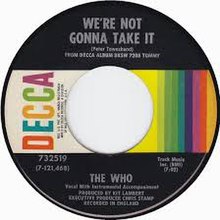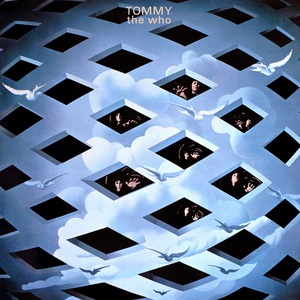
Tommy is the fourth studio album by the English rock band The Who, a double album first released on 17 May 1969. The album was mostly composed by guitarist Pete Townshend, and is a rock opera that tells the story of Tommy Walker. Tommy is traumatized from witnessing his mother's lover, kill his father. Tommy's mother and lover compound his trauma by denying the experience. In reaction, Tommy becomes dissociative. Tommy then experiences the trauma of being sexually abused. As a way of coping with his trauma, Tommy dissociates further through playing pinball. He gains a following because of his skill at playing pinball. After numerous misguided attempts to heal Tommy, a doctor prescribes him a mirror so he can confront himself and his experience. Instead, Tommy becomes self-absorbed and comes to think of himself as a messianic figure. When the mirror is eventually broken, Tommy comes out of his dissociative state. Tommy then tries to lead his followers to believe that the only path to healing is through him. His followers eventually reject him and his teachings.
Lifehouse is an unfinished science fiction rock opera by The Who intended as a follow-up to Tommy. It was abandoned as a rock opera in favour of creating the traditional rock album Who's Next, though its songs would appear on various albums and singles by the Who, as well as Pete Townshend's solo albums. In 1978, aspects of the Lifehouse project were revisited by the Who on Who Are You. In 2000, Townshend revived the Lifehouse concept with his set Lifehouse Chronicles and the sampler Lifehouse Elements. On 1 May 2007, he released an online software called The Lifehouse Method in which any "sitter" could create a musical "portrait". The site is now defunct.

Tommy is a 1975 British satirical operetta fantasy drama film written and directed by Ken Russell and based upon The Who's 1969 rock opera album Tommy about a "psychosomatically deaf, mute, and blind" boy who becomes a pinball champion and religious leader. The film featured a star-studded ensemble cast, including the band members themselves, Ann-Margret, Oliver Reed, Eric Clapton, Tina Turner, Elton John, and Jack Nicholson.

"Overture" is a song by English rock band the Who, written by Pete Townshend. The track is one of three instrumental tracks released on Tommy, the other two being "Underture" and "Sparks".

"Pinball Wizard" is a song written by Pete Townshend and performed by the English rock band the Who, featured on their 1969 rock opera album Tommy. The original recording was released as a single in 1969 and reached No. 4 in the UK charts and No. 19 on the U.S. Billboard Hot 100.

Then and Now is a 2004 greatest hits compilation album by The Who released internationally by Polydor Records and by Geffen Records in the United States. It features 18 Who classics and two new tracks—"Real Good Looking Boy" and "Old Red Wine"—which were the first Who originals since "Dig" from Pete Townshend's 1989 album The Iron Man. "Real Good Looking Boy" is a tribute to Elvis Presley, and "Old Red Wine" is a tribute to former band member John Entwistle, who died in 2002. The album was re-released in 2007 and replaced "Old Red Wine" with "It's Not Enough" from the 2006 album Endless Wire and "Summertime Blues" was replaced by "Baba O'Riley".
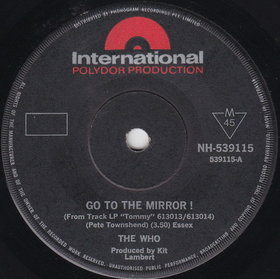
"Go to the Mirror!" is a song written by Pete Townshend of the Who. It appears as the fifteenth track on the group's first rock opera, Tommy (1969). "Go to the Mirror!" is included on the list of The Rock and Roll Hall of Fame's 500 Songs that Shaped Rock and Roll.

"I'm Free" is a song written by Pete Townshend and performed by the Who on the album Tommy. The song has since been released as a single, becoming one of the best known tracks from Tommy.
"Christmas" is a song written by Pete Townshend and is the seventh song on The Who's rock opera Tommy. On the original LP, it opens the second side of the album.
The Who Tour 2006–2007 was The Who's first worldwide concert tour since 1997, supporting their Endless Wire album.

Live from Toronto is a double live album by The Who recorded during the last concert of the It's Hard Tour at the Maple Leaf Gardens in Toronto, 17 December 1982. These performances were originally broadcast live on cable TV and FM radio across the U.S. and Canada. It was later released in the early 1980s on VHS video tape.
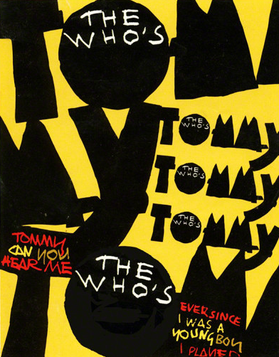
The Who's Tommy is a rock musical with music and lyrics by Pete Townshend and a book by Townshend and Des McAnuff. It is based on the 1969 rock opera Tommy by The Who.

Tommy is a soundtrack album by The Who with contributions from numerous artists. The soundtrack was used in the 1975 Tommy film that was based on the original album that was released by The Who in 1969. Pete Townshend oversaw the production of this double-LP recording that returned the music to its rock roots, and on which the unrecorded orchestral arrangements he had envisaged for the original Tommy LP were realised by the extensive use of synthesiser.
Tommy and Quadrophenia Live is a 3-disc DVD box set that includes performances by The Who from their 1989 and 1996-1997 tours. Whilst the Tommy part of the set had been already released on VHS, material from the Quadrophenia Tour had not been commercially available previously.
Live at the Isle of Wight Festival 1970 is concert film of The Who's concert at the Isle of Wight Festival 1970. While the concert occurred on 30 August 1970 at 2:00 am, a VHS was not released until 1996. A compact disc of the concert was also released in 1996. The concert was re-released on DVD in 1998 in the United States and 2006 in the United Kingdom.
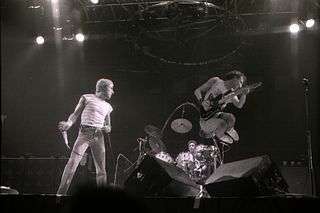
The Who Tour 1980 was The Who's second concert tour since the death of original drummer Keith Moon, supporting their 1978 album Who Are You.

Now is a 1973 album by British pop group the New Seekers. It was retitled Pinball Wizards in the US.
2017 Tommy & More was a United Kingdom 7-date concert tour by British band The Who. The first two nights saw the band performing live in its entirety their 1969 studio album Tommy along with a few classics, with the rest of the tour featuring an extended Tommy set as a centerpiece to an otherwise greatest hits show.

The Moving On! Tour was a symphonic concert tour by the British rock band the Who, partially in support of their album Who.
The Who by Numbers Tour was a concert tour by the English rock band the Who, in support of their seventh album, The Who by Numbers (1975). It began on 3 October 1975, ended on 21 October 1976 and consisted of 79 concerts split between North America and Europe. Despite being named after The Who by Numbers, few songs from the album were actually performed during the tour.
